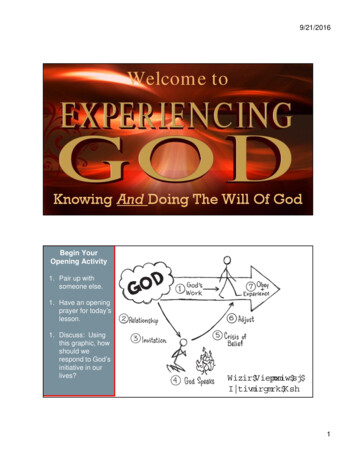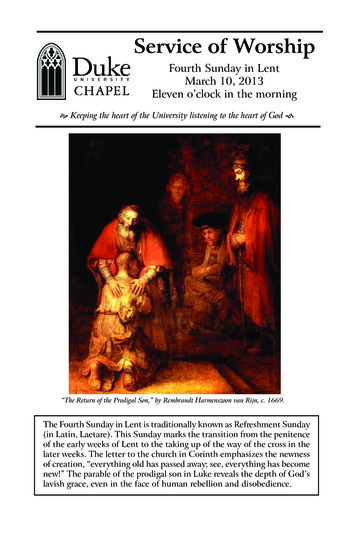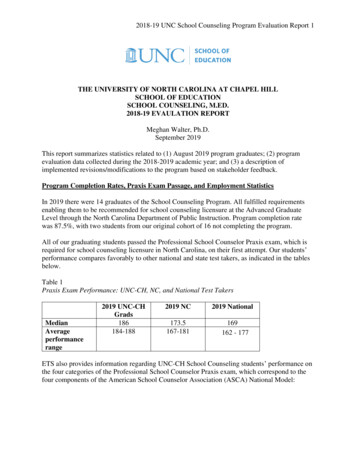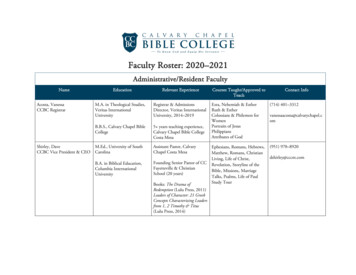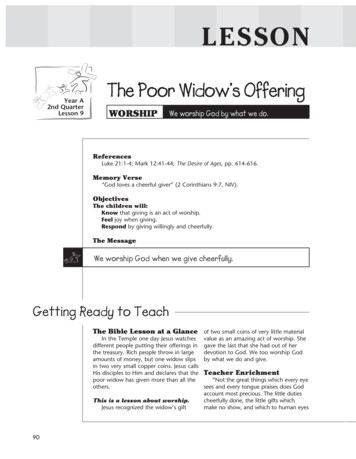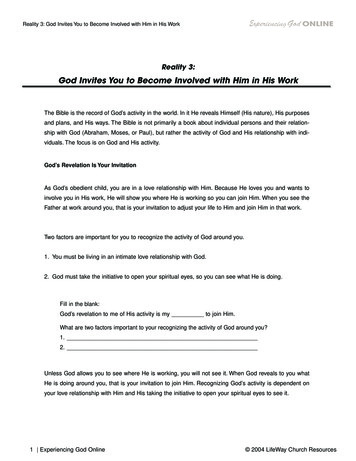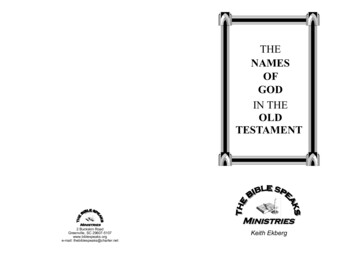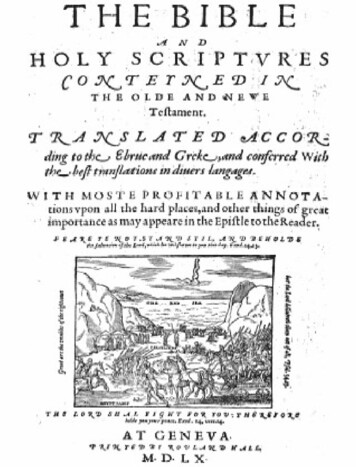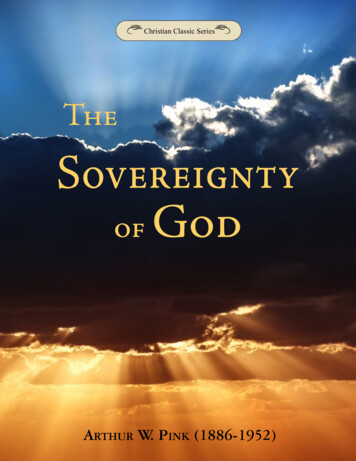
Transcription
Christian Classic SeriesTheSovereigntyof GodArthur W. Pink (1886-1952)
THE SOVEREIGNTYOF G ODContentsForeword . 3Introduction . 71God’s Sovereignty Defined. 132The Sovereignty of God in Creation. 203The Sovereignty of God in Administration . 234The Sovereignty of God in Salvation. 335The Sovereignty of God in Reprobation . 566The Sovereignty of God in Operation . 767God’s Sovereignty and the Human Will . 878God’s Sovereignty and Human Responsibility . 999God’s Sovereignty and Prayer . 11410Our Attitude Toward His Sovereignty . 12411Difficulties and Objections . 13412The Value of This Doctrine . 14913Conclusion . 160
2T HE S OVEREIGNTY OF G ODThe Sovereignty of God, by Arthur W. Pink (1886-1952), was first published in 1919; a second editionappeared in 1921, and this third and final edition in 1929. Chapel Library has added sectional subheadings and extensive footnotes to assist the reader for biographies, archaic/unusual words, andexplanations. Rarely, words have been added in order to improve comprehension of a passage;when this has been done, the words are always enclosed in [brackets]. When brackets appear withinBible quotations, the additions are from the author.A. W. Pink also published Studies in the Scriptures as a monthly 28-page digest from 1922 to 1953.Each issue contains serialized articles on six to eight biblical topics. When he completed one topic,he began in its place another topical series in the next issue. In total, the 380 issues comprise a biblical and theological treasure of immense proportions. Chapel Library has reprinted the monthlyissues from 1932, which can be requested by mail—also available for free download worldwide fromour website.Today the various subjects are being gathered together by topic and republished by several sources.Chapel Library offers the following as paperbacks at the time of this printing:1 John – An Exposition, Part 1 The Doctrine of Sanctification*1 John – An Exposition, Part 2 The Holy Spirit*The Attributes of God*Profiting from the Word*Comfort for ChristiansSeven Sayings of the SaviorThe Doctrine of Human Depravity Spiritual Union and CommunionThe Doctrine of Revelation* study guide available Copyright 1999 Chapel Library: annotations. Printed in the USA. All scripture quotations arethe King James Version unless indicated otherwise. Chapel Library does not necessarily agree withall the doctrinal positions of the authors it publishes. This edition features reflection questions after each chapter; a more complete study guide is available from Mount Zion Bible Institute. Permissionis expressly granted to reproduce this material by any means, provided1) you do not charge beyond a nominal sum for cost of duplication;2) this copyright notice and all the text on this page are included.Chapel Library sends Christ-centered materials worldwide without charge, relying entirely uponGod’s faithfulness. We therefore do not solicit donations, but we gratefully receive support fromthose who freely desire to give.Worldwide, please download material without charge from our website, or contact the internationaldistributor as listed there for your country.In North America, for additional copies of this paperback or other Christ-centered materials fromprior centuries, please contactCHAPEL LIBRARY2603 W. Wright St. Pensacola, Florida 32505 USAchapel@mountzion.org www.ChapelLibrary.orgPhone: (850) 438-6666 Fax: (850) 438-0227
THE SOVEREIGNTYOF GODFOREWORDForeword to the First EditionIn the following pages an attempt has been made to examine anew in the light of God’sWord some of the profoundest questions that can engage the human mind. Others have grappled with these mighty problems in days gone by, and from their labors we are the gainers.While making no claim for originality, the writer, nevertheless, has endeavored to examineand deal with his subject from an entirely independent viewpoint. We have studied diligentlythe writings of such men as Augustine (430) and Aquinas (1274), Calvin (1564) and Melancthon (1555), Jonathan Edwards (1758) and Ralph Erskine (1752), Andrew Fuller (1815) and1Robert Haldane (1842). And sad it is to think that these eminent and honored names are almost entirely unknown to the present generation. Though, of course, we do not endorse alltheir conclusions, yet we gladly acknowledge our deep indebtedness to their works. We havepurposely refrained from quoting freely from these deeply taught theologians, because we desired that the faith of our readers should stand not in the wisdom of men but in the power ofGod. For this reason we have quoted freely from the Scriptures and have sought to furnishproof-texts for every statement we have advanced.It would be foolish for us to expect that this work will meet with general approval. Thetrend of modern theology—if theology it can be called—is ever toward the deification of thecreature rather than the glorification of the Creator, and the leaven 2 of present-day Rationalism 3 is rapidly permeating the whole of Christendom. The malevolent effects of Darwinianismare more far reaching than most are aware. Many of those among our religious leaders who123Among those who have dealt most helpfully with the subject of God’s sovereignty in recent years, we mention Drs. Rice, J. B. Moody, and George S. Bishop, from whose writings we have also received instruction.—A.W.P.leaven – that which permeates with an altering or transforming influence; biblically, that which continually spreads to corrupt sound doctrine.Rationalism – philosophy that human reason, unaided by divine revelation, is the sole guide to all attainable religious truth.
4T HE S OVEREIGNTY OF G ODare still regarded as orthodox 4 would, we fear, be found to be very heterodox 5 if they wereweighed in the balances of the sanctuary. Even those who are clear intellectually upon othertruths are rarely sound in doctrine. Few, very few, today, really believe in the complete ruinand total depravity of man. Those who speak of man’s “free will,” and insist upon his inherentpower to either accept or reject the Saviour, do but voice their ignorance of the real conditionof Adam’s fallen children. And if there are few who believe that, so far as he is concerned, thecondition of the sinner is entirely hopeless, there are fewer still who really believe in the absolute sovereignty of God.In addition to the widespread effects of unscriptural teaching, we also have to reckon withthe deplorable superficiality of the present generation. To announce that a certain book is atreatise on doctrine is quite sufficient to prejudice against it the great bulk of church-members and most of our preachers as well. The craving today is for something light and spicy, andfew have patience, still less desire, to examine carefully that which would make a demand bothupon their hearts and their mental powers. We remember, also, how that it is becoming increasingly difficult in these strenuous days for those who are desirous of studying the deeperthings of God to find the time that such study requires. Yet, it is still true that “Where there’sa will, there’s a way,” and in spite of the discouraging features referred to, we believe there iseven now a godly remnant who will take pleasure in giving this little work a careful consideration—and such will, we trust, find in it “meat in due season.”We do not forget the words of one long since passed away, namely, that “Denunciation isthe last resort of a defeated opponent.” To dismiss this book with the contemptuous epithet6“hyper-Calvinism!” will not be worthy of notice. For controversy we have no taste, and weshall not accept any challenge to enter the lists against those who might desire to debate thetruths discussed in these pages. So far as our personal reputation is concerned, that we leaveour Lord to take care of, and unto Him we would now commit this volume and whatever fruitit may bear, praying Him to use it for the enlightening of His own dear people (insofar as it isin accord with His Holy Word) and to pardon the writer for and preserve the reader from theinjurious effects of any false teaching that may have crept into it. If the joy and comfort thathave come to the author while penning these pages are shared by those who may scan them,then we shall be devoutly thankful to the One Whose grace alone enables us to discern spiritual things.—Arthur W. Pink, June 1918456orthodox – literally, “right belief ”; holding the body of doctrines that are essential to the Christian faith;this implies consistency in belief and worship with the revelation of Holy Scripture.heterodox – departing from established doctrines; inclining toward heresy.hyper-Calvinism – the distortion of reformed doctrine which holds that because God has infallibly savedthose He has marked out for salvation, there is no need for human obedience to the Great Commission inevangelizing the world.
Foreword5Foreword to the Second EditionIt is now two years since the first edition of this work was presented to the Christian public.Its reception has been far more favorable than the author had expected. Many have notifiedhim of the help and blessing received from a perusal of his attempts to expound what is admittedly a difficult subject. For every word of appreciation we return hearty thanks to Him inWhose light we alone “see light.” A few have condemned the book in unqualified terms, andthese we commend to God and to the Word of His grace, remembering that it is written, “aman can receive nothing, except it be given him from heaven” (Joh 3:27). Others have sent usfriendly criticisms and these have been weighed carefully—and we trust that, in consequence,this revised edition will be unto those who are members of the household of faith more profitable than the former one.One word of explanation seems to be called for. A number of respected brethren in Christfelt that our treatment of the sovereignty of God was too extreme and one-sided. It has beenpointed out that a fundamental requirement in expounding the Word of God is the need ofpreserving the balance of truth. With this we are in hearty accord. Two things are beyond dispute: God is sovereign, and man is a responsible creature. But in this book we are treating ofthe sovereignty of God, and while the responsibility of man is readily owned, yet we do notpause on every page to insist on it. Instead, we have sought to stress that side of the truthwhich in these days is almost universally neglected. Probably 95 percent of the religious literature of the day is devoted to a setting forth of the duties and obligations of men.The fact is that those who undertake to expound the responsibility of man are the very oneswho have lost “the balance of truth” by ignoring, very largely, the sovereignty of God. It is perfectly right to insist on the responsibility of man, but what of God?—Has He no claims, norights! A hundred such works as this are needed; ten thousand sermons would have to bepreached throughout the land on this subject, if the “balance of truth” is to be regained. The“balance of truth” has been lost, lost through a disproportionate emphasis being thrown onthe human side, to the minimizing, if not the exclusion, of the divine side.We grant that this book is one-sided, for it only pretends to deal with one side of the truth,and that is the neglected side, the divine side. Furthermore, the question might be raised,Which is the more to be deplored: an over-emphasizing of the human side and an insufficientemphasis on the divine side, or an over-emphasizing of the divine side and an insufficient emphasis on the human side? Surely, if we err at all it is on the right side. Surely, there is farmore danger of making too much of man and too little of God, than there is of making toomuch of God and too little of man. Yea, the question might well be asked, Can we press God’sclaims too far? Can we be too extreme in insisting upon the absoluteness and universality ofthe sovereignty of God?It is with profound thankfulness to God that, after a further two years diligent study of HolyWrit, with the earnest desire to discover what almighty God has been pleased to reveal to Hischildren on this subject, we are able to testify that we see no reason for making any retractionsfrom what we wrote before, and while we have re-arranged the material of this work, the sub-
6T HE S OVEREIGNTY OF G ODstance and doctrine of it remains unchanged. May the One Who condescended to bless the firstedition of this work be pleased to own even more widely this revision.—Arthur W. Pink, Swengel, Pennsylvania, USA, 1921Foreword to the Third EditionThat a third edition of this work is now called for, is a cause of fervent praise to God. As thedarkness deepens and the pretentions of men are taking on an ever-increasing blatancy, theneed becomes greater for the claims of God to be emphasized. As the twentieth century Babelof religious tongues is bewildering so many, the duty of God’s servants to point to the one sureanchorage for the heart is the more apparent. Nothing is so tranquilizing and so stabilishingas the assurance that the Lord Himself is on the throne of the universe, working “all thingsafter the counsel of his own will” (Eph 1:11).The Holy Spirit has told us that there are in the Scriptures some things hard to be understood (2Pe 3:16), but mark, it is “hard,” not “impossible!” A patient waiting on the Lord, a diligent comparison of Scripture with Scripture, often issues in a fuller apprehension of thatwhich before was obscure to us. During the last ten years it has pleased God to grant us further light on certain parts of His Word, and this we have sought to use in improving our expositions of different passages. But it is with unfeigned thanksgiving that we find it unnecessaryto either change or modify any doctrine contained in the former editions. Yea, as time goes by,we realize (by divine grace) with ever-increasing force, the truth, the importance, and the value, of the sovereignty of God as it pertains to every branch of our lives.Our hearts have been made to rejoice again and again by unsolicited letters that have cometo hand from every quarter of the earth, telling of help and blessing received from the formereditions of this work. One Christian friend was so stirred by reading it and so impressed by itstestimony, that a check was sent to be used in sending free copies to missionaries in fifty foreign countries, “that its glorious message may encircle the globe”—numbers of whom havewritten us to say how much they have been strengthened in their fight with the powers of7darkness. To God alone belongs all the glory. May He deign to use this third edition to thehonor of His own great name, and to the feeding of His scattered and starved sheep.—Arthur W. Pink, Morton’s Gap, Kentucky, USA, 19297deign – descend to the level of one considered inferior, i.e., lower Himself.
INTRODUCTIONA. The Great QuestionWho is regulating affairs on this earth today: God or the devil? That God reigns supreme inheaven is generally conceded; that He does so over this world is almost universally denied—ifnot directly, then indirectly. More and more are men, in their philosophizing and theorizing,relegating God to the background. Take the material realm. Not only is it denied that God cre1ated everything by personal and direct action, but few believe that He has any immediate concern in regulating the works of His own hands. Everything is supposed to be orderedaccording to the (impersonal and abstract) “laws of nature.” Thus is the Creator banished fromHis own creation. Therefore we need not be surprised that men, in their degrading conceptions, exclude Him from the realm of human affairs.Throughout Christendom, with an almost negligible exception, the theory is held that manis “a free agent,” and therefore, lord of his fortunes and the determiner of his destiny. That Satan is to be blamed for much of the evil which is in the world is freely affirmed by those who,though having so much to say about “the responsibility of man,” often deny their own responsibility by attributing to the devil what, in fact, proceeds from their own evil hearts (Mar 7:2123).But who is regulating affairs on this earth today: God or the devil? Attempt to take a seriousand comprehensive view of the world: What a scene of confusion and chaos confronts us onevery side! Sin is rampant; lawlessness abounds; evil men and seducers are waxing “worse andworse” (2Ti 3:13). Today, everything appears to be out of joint. Thrones are creaking and tottering, ancient dynasties are being overturned, democracies are revolting, civilization is ademonstrated failure; half of Christendom was but recently locked together in a death grapple; 2 and now that the titanic conflict is over, instead of the world having been made “safe fordemocracy,” we have discovered that democracy is very unsafe for the world. Unrest, discontent, and lawlessness are rife everywhere, and none can say how soon another great war will beset in motion. Statesmen are perplexed and staggered. Men’s hearts are “failing them for fear,and for looking after those things which are coming on the earth” (Luk 21:26). Do thesethings look as though God had full control?But let us confine our attention to the religious realm. After nineteen centuries of gospelpreaching, Christ is still “despised and rejected of men” (Isa 53:3). Worse still, He (the Christof Scripture) is proclaimed and magnified by very few. In the majority of modern pulpits He isdishonored and disowned. Despite frantic efforts to attract the crowds, the majority of thechurches are being emptied rather than filled. And what of the great masses of non-churchgoers? In the light of Scripture we are compelled to believe that the “many” are on the broad12immediate – without the intervention of another cause; direct.Reference is to the devastation of World War I.
8T HE S OVEREIGNTY OF G ODroad that leadeth to destruction, and that only “few” are on the narrow way that leadeth untolife. Many are declaring that Christianity is a failure, and despair is settling on many faces. Nota few of the Lord’s own people are bewildered, and their faith is being severely tried. And whatof God? Does He see and hear? Is He impotent or indifferent? A number of those who are regarded as leaders of Christian-thought told us that God could not help the coming of the lateawful war, and that He was unable to bring about its termination. It was said, and said openly,that conditions were beyond God’s control. Do these things look as though God were rulingthe world?Who is regulating affairs on this earth today: God or the devil? What impression is madeupon the minds of those men of the world who, occasionally, attend a gospel service? What arethe conceptions formed by those who hear even those preachers who are counted as “orthodox”? Is it not that a disappointed God is the One Whom Christians believe in? From what isheard from the average evangelist today, is not any serious hearer obliged to conclude that heprofesses to represent a god who is filled with benevolent intentions, yet unable to carry themout; that he is earnestly desirous of blessing men, but that they will not let him? Then, mustnot the average hearer draw the inference that the devil has gained the upper hand, and thatGod is to be pitied rather than blamed?But does not everything seem to show that the devil has far more to do with the affairs ofearth than God has? Ah, it all depends upon whether we are walking by faith or walking bysight (2Co 5:7). Are your thoughts, my reader, concerning this world and God’s relation to it,based upon what you see? Face this question seriously and honestly. And if you are a Christianyou will, most probably, have cause to bow your head with shame and sorrow, and toacknowledge that it is so. Alas, in reality, we walk very little “by faith.” But what does “walkingby faith” signify? It means that our thoughts are formed, our actions regulated, our livesmolded by the Holy Scriptures, for “faith cometh by hearing, and hearing by the word of God”(Rom 10:17). It is from the Word of Truth, and that alone, that we can learn what is God’s relation to this world.Who is regulating affairs on this earth today: God or the devil? What saith the Scriptures?Ere we consider the direct reply to this query, let it be said that the Scriptures predicted justwhat we now see and hear. The prophecy of Jude is in course of fulfillment. It would lead ustoo far astray from our present inquiry to fully amplify this assertion, but what we have particularly in mind is a sentence in verse 8—“Likewise also these filthy dreamers defile the flesh,despise dominion, and speak evil of dignities.”Yes, they “speak evil” of the supreme dignity, the “only Potentate, the King of kings, andLord of lords” (1Ti 6:15). Ours is peculiarly an age of irreverence, and as the consequence, thespirit of lawlessness, which brooks no restraint and which is desirous of casting off everythingthat interferes with the free course of self-will, is rapidly engulfing the earth like some gianttidal wave. The members of the rising generation are the most flagrant offenders, and in thedecay and disappearing of parental authority we have the certain precursor of the abolition ofcivic authority.Therefore, in view of the growing disrespect for human law and the refusal to “render honor to whom honor” is due (Rom 13:7), we need not be surprised that the recognitionof the majesty, the authority, the sovereignty of the almighty Law-giver should recede moreand more into the background, and the masses have less and less patience with those who in-
Introduction9sist upon them. And conditions will not improve; instead, the more sure Word of Prophecymakes known to us that they will grow worse and worse. Nor do we expect to be able to stemthe tide—it has already risen much too high for that. All we can now hope to do is warn ourfellow-saints against the spirit of the age, and thus seek to counteract its baneful 3 influenceupon them.B. What Saith the Scriptures?Who is regulating affairs on this earth today: God or the devil? What saith the Scriptures? Ifwe believe their plain and positive declarations, no room is left for uncertainty. They affirm,again and again, that God is on the throne of the universe; that the scepter is in His hands;that He is directing “all things after the counsel of his own will” (Eph 1:11). They affirm, notonly that God created all things, but also that God is ruling and reigning over all the works ofHis hands. They affirm that God is the “Almighty,” that His will is irreversible, that He is absolute sovereign in every realm of all His vast dominions. And surely it must be so. Only two alternatives are possible: God must either rule, or be ruled; sway, or be swayed; accomplish Hisown will, or be thwarted by His creatures. Accepting the fact that He is the “Most High,” theonly Potentate and King of kings, vested with perfect wisdom and illimitable power, and theconclusion is irresistible that He must be God in fact as well as in name.It is in view of what we have briefly referred to above, that we say present-day conditionscall loudly for a new examination and new presentation of God’s omnipotency, God’s sufficiency, and God’s sovereignty. From every pulpit in the land it needs to be thundered forth thatGod still lives, that God still observes, that God still reigns. Faith is now in the crucible, it isbeing tested by fire, and there is no fixed and sufficient resting-place for the heart and mindbut in the throne of God. What is needed now, as never before, is a full, positive, constructivesetting forth of the Godhood of God. Drastic diseases call for drastic remedies. People are wea4ry of platitudes and mere generalizations—the call is for something definite and specific.Soothing-syrup may serve for peevish children, but an iron tonic is better suited for adults,and we know of nothing that is more calculated to infuse spiritual vigor into our frames than ascriptural apprehension of the full character of God. It is written, “The people that do knowtheir God shall be strong and do exploits” (Dan 11:32).Without a doubt a world-crisis is at hand and everywhere men are alarmed. But God is not!He is never taken by surprise. It is no unexpected emergency that now confronts Him, for Heis the One who “worketh all things after the counsel of his own will” (Eph 1:11). Hence,though the world is panic-stricken, the word to the believer is: “Fear not!” “All things” aresubject to His immediate control; “all things” are moving in accord with His eternal purpose;and therefore “all things” are working “together for good to them that love God, to them whoare the called according to his purpose” (Rom 8:28). It must be so, for “of him, and throughhim, and to him are all things” (Rom 11:36). Yet how little is this realized today, even by thepeople of God! Many suppose that He is little more than a far-distant spectator, taking no immediate hand in the affairs of earth. It is true that man is endowed with power, but God is allpowerful. It is true that, speaking generally, the material world is regulated by law, but behindthat law is the Law-Giver and Law-Administrator. Man is but the creature; God is the Crea34baneful – exceedingly harmful.platitudes – flat, dull, or trite remarks, uttered as if they were fresh and profound.
10T HE S OVEREIGNTY OF G ODtor—and endless ages before man first saw the light, “the mighty God” (Isa 9:6) existed and,ere the world was founded, made His plans. Being infinite in power and man only finite, Hispurpose and plan cannot be withstood or thwarted by the creatures of His own hands.We readily acknowledge that life is a profound problem and that we are surrounded by mystery on every side; but we are not like the beasts of the field: ignorant of their origin, and unconscious of what is before them. No: “We have also a more sure word of prophecy,” of whichit is said ye do well that ye “take heed, as unto a light that shineth in a dark place, until the daydawn, and the day star arise in your hearts” (2Pe 1:19). And it is to this word of prophecy weindeed do well to “take heed,” to that Word which had not its origin in the mind of man but inthe mind of God, “For the prophecy came not in old time by the will of man: but holy men ofGod spake as they were moved by the Holy Ghost” (2Pe 1:21). We say again, it is to this “Word”we do well to take heed.1. Our methodAs we turn to this Word and are instructed thereat, we discover a fundamental principlethat must be applied to every problem: Instead of beginning with man and his world and working back to God, we must begin with God and work down to man—“In the beginning God !”Apply this principle to the present situation. Begin with the world as it is today and try andwork back to God, and everything will seem to show that God has no connection with theworld at all. But begin with God and work down to the world, and light, much light, is cast onthe problem. Because God is holy His anger burns against sin; because God is righteous Hisjudgments fall upon those who rebel against Him; because God is faithful the solemn threatenings of His Word are fulfilled; because God is omnipotent none can successfully resist Him,still less overthrow His counsel; and because God is omniscient, no problem can master Himand no difficulty baffle His wisdom. It is just because God is who He is and what He is that weare now beholding on earth what we do: the beginning of His outpoured judgments. In view of5His inflexible justice and immaculate holiness, we could not expect anything other than whatis now spread before our eyes.2. Faith requiredBut let it be said very emphatically that the heart can only rest upon and enjoy the blessedtruth of the absolute sovereignty of God as faith is in exercise. Faith is ever occupied with God.That is the character of it; that is what differentiates it from intellectual theology. Faith endures “as seeing him who is invisible” (Heb 11:27); endures the disappointments, the hardships, and the heartaches of life by recognizing that all comes from the hand of Him Who istoo wise to err and too loving to be unkind. But so long as we are occupied with any other object than God Himself there will be neither rest for the heart nor peace for the mind. But whenwe receive all that enters our lives as from His hand, then, no matter what may be our circumstances or surroundings—whether in a hovel, a prison, a dungeon, or a martyr’s stake—weshall be enabled to say, “The lines are fallen unto
2 THE SOVEREIGNTY OF GOD. The Sovereignty of God, by Arthur W. Pink (1886-1952), was first published in 1919; a second edition appeared in 1921,and this third and final edition in 1929Chapel Library has added sectional su. b-headings and extensive footnotes to assi

